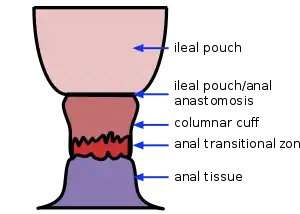Cuffitis
Cuffitis is inflammation at the anal transition zone or "cuff" created as a result of ileal pouch-anal anastomosis (IPAA).[1] It is considered a variant form of ulcerative colitis that occurs in the rectal cuff.[2] Cuffitis is a common complication of IPAA, particularly when a stapled anastomosis without mucosectomy procedure has been used.[2]
| Cuffitis | |
|---|---|
 | |
| Different regions of Ileal pouch-anal anastomosis | |
| Specialty | General surgery |
Signs and symptoms
Symptoms of cuffitis mimic those of pouchitis.[2] In addition, patients with cuffitis often present with small volume bloody bowel movements.[2] Often, cuffitis can produce the appearance of bright red blood on tissue.[1]
Complications
Surgery-associated ischemia may contribute inflammation at the anal transitional zone.[2]
Patients whose cuffitis is refractory to mesalamine and/or corticosteroids should be evaluated for other disease in the cuff area, such as fistula or anastomotic leaks.[2] Cuffitis that is refractory to medication can also be a sign of Crohn's disease of the pouch.[2]
Chronic cuffitis can also contribute to the development of anastomotic stricture.[2]
Cuffitis that is refractory, Crohn's-related, or is associated with surgical complications can contribute to pouch failure.[2]
Treatment
Cuffitis is treated with mesalamine suppositories or topical application of lidocaine or corticosteroid medications.[2] Systemic medications are rarely used.[2]
References
- "Pouchitis: Causes, Symptoms & Treatment | Cleveland Clinic". my.clevelandclinic.org. Retrieved 2016-12-12.
- Shen, Bo (2016-12-12). "Diagnosis and Management of Postoperative Ileal Pouch Disorders". Clinics in Colon and Rectal Surgery. 23 (4): 259–268. doi:10.1055/s-0030-1268252. ISSN 1531-0043. PMC 3134805. PMID 22131896.